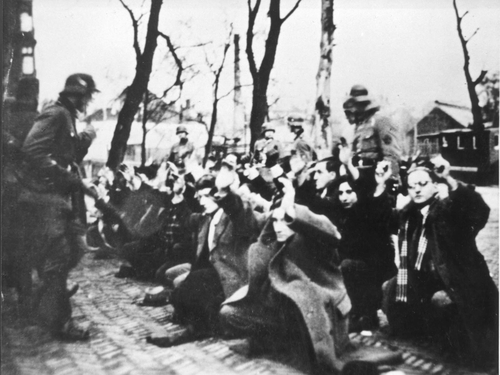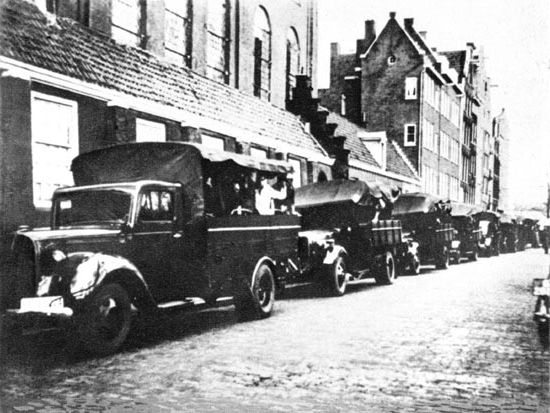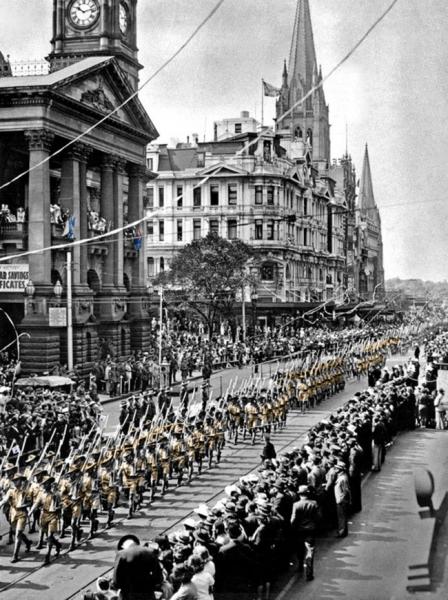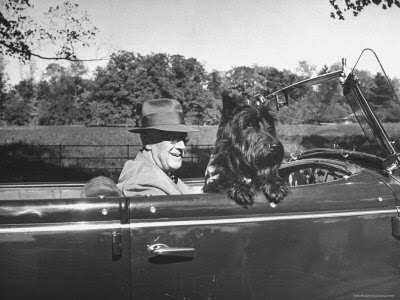Sunday 23 February 1941
 |
| HMS Terror, sunk today. |
In Cairo, Middle East Commander Archibald Wavell considers, then rejects a proposal from London that the RAF bomb the Ploesti oil fields from bases in Greece. He reasons that this would violate Turkish air space and also give the Wehrmacht a pretext (not that it needs one) to invade Greece by revealing the British presence there. Neither of those reasons, however, has a particularly strong foundation (Hitler should know about RAF activity in Albania already, and the bombers could avoid Turkey). However, there is another reason that would make any attack on the oil fields explosive in more ways than one. While the British don't know this, one of Hitler's greatest fears (he confesses to Marshal Mannerheim at their meeting in June 1942 that he has nightmares about it) is the Allied bombing of the Romanian oil fields. RAF attacks on the oil could force Hitler's hand early before the British are even on mainland Greece. Thus, Wavell makes the proper decision from mistaken premises. Great weight is placed upon Wavell's support since it is common knowledge (as noted in the minutes) that he would prefer to finish off the Axis forces in North Africa first.
Prime Minister Churchill, the most ardent backer of a British presence in Greece, is under no illusions about possible success in the Balkans. He notes in a message to Eden that the "odds seem heavily against us in Greece." Australian Prime Minister Menzies discusses the question of a campaign in Greece "largely with Australian & New Zealand troops" with the heads of RAF Bomber Command (Air Marshal Sir Richard Pearse) and Fighter Command (Sholto Douglas) and comes away with more questions than answers. He notes that committing his men to an uncertain campaign in Greece "is not easy." A big War Cabinet meeting is scheduled for the 24th to discuss the issue, and Menzies is a troubled man.
East African Campaign: Operation Canvas begins. It is a two-pronged advance to take Mogadishu and other Italian forces in Italian Somaliland (Somalia). Having pocketed Jelib (Somalia), General Cunningham begins sending his forces on the road northeast to Mogadishu. He sends the 11th African Division together with the 23rd Nigerian and 22nd East African Brigades toward Mogadishu. Italian defenses are now in a state of collapse, and the 35th Works Company quickly throws a bridge across the Juba river at Mabungo. Meanwhile, the British 12th African Division drives along the Juba River toward the Abyssinian border.
Indian 7th Infantry Brigade and Free French Brigade d'Orient capture Cub Cub. The British capture 436 prisoners, four guns and many supplies.
 |
| Propaganda leaflet dropped in France, 23/24 and 24/25 February 1941 (McMaster University, WWII Propaganda Collection 0102). |
RAF Bomber Command attacks Boulogne with 52 planes.
Battle of the Atlantic: A classic Wolf Pack operation unfolds against Convoy OB 288 south of Iceland. It is a textbook operation of how the Luftwaffe can work in combination with the U-boat fleet to wreak devastation on the convoys. A Focke-Wulf Fw 200 Condor of I,/KG 40 spots Convoy OB 288 heading west about 500 km south of Iceland (370 km northwest of Rockall). The convoy has dispersed and is without escort, but it aware that it is being shadowed and has turned north to avoid U-boats. The ships also close up their spacing again - which makes it easier to attack them.
The Condor vectors in (via U-boat command B.d.U) every U-boat and Italian submarine in the vicinity:
- U-69 (Kapitänleutnant Jost Metzler, first patrol)
- U-73 (Kptlt. Helmut Rosenbaum)
- U-95 (Kptlt. Gerd Schreiber)
- U-96 (Kptlt. Heinrich Lehmann-Willenbrock)
- U-107 (K.Kapt. Günther Hessler, first patrol)
- U-123 (Kptlt. Karl-Heinz Moehle)
- Italian submarine Michele Bianchi (C.C. Adalberto Giovannini, first BETASOM patrol from Bordeaux)
- Italian submarine Barbarigo (Capitano di Corvetta Enzo Grossi)
- 4542-ton British freighter Marslew (U-69, 13 deaths, 23 survivors)
- 5457-ton British freighter Anglo-Peruvian (U-96, 29 deaths, 17 survivors)
- 3385-ton British freighter Linaria (U-96)
- 5458-ton British freighter Sirikishna (U-69)
- 3807-ton British freighter Cape Nelson (U-95)
- 1908-ton Norwegian freighter Svein Jarl (U-95, all 22 perish)
- 4427-ton British freighter Temple Moat (U-95, a straggler)
- 5360-ton Royal Navy ocean boarding ship HMS Manistee (U-107, no survivors)
- 8685-ton Dutch freighter Grootekerk (U-123, no survivors)
- 4260-ton British freighter Waynegate (U-73)
- 5360-ton British freighter Manistree (U-107, first attacked by Bianchi, all 141 perish)
- 10,946-ton British transport Huntingdon (Bianchi and U-96, everyone survives).
The Linaria sinking is particularly murky, as Italian submarine Bianchi, U-73 and U-96 all may have sunk it. The sinking of the Huntingdon also is murky, but the best scholarship (Jürgen Rohwer, Bibliothek für Zeitgeschichte, Marinearchiv) suggests that U-96 hit the ship first, followed by the kill shot from Bianchi. Even the men on the scene did not know who did what, so piecing it all together requires a lot of detective work, comparison of different accounts and the like.
British 698-ton coaster Shoal Fisher hits a mine and sinks east of Falmouth. Everyone survives and arrives safely at Falmouth.
Convoy OB 290 departs from Liverpool, Convoy HX 111 departs from Halifax.
 |
| President Roosevelt and Fala in his Ford Phaeton, February 1941 (National Archives NPx 73-113:59). |
Greek submarine Nereus claims to sink an Italian freighter near Valona in the Adriatic, but there is no confirmation.
A German convoy departs from Naples bound for Tripoli. It has a heavy escort and carries more troops for General Rommel's Afrika Korps.
Royal Navy Monitor HMS Terror, bombed on the 22nd, sinks off the Libyan coast at 04:20. The Luftwaffe continues its attacks on Benghazi and Tobruk.
The Free French continue bombarding Italian fortress El Tag at Kufra. The Italians are holding out, but are not mounting any sorties despite outnumbering the surrounding French.
Governor Lt. General William Dobbie issues a statement about conscription on Malta, which as created many hard feelings among the locals:
We must be as strong as possible in order to ensure that all attacks are decisively beaten off, should they be attempted. The Government must, therefore be in a position to utilise the resources of Malta (including the manpower) to the best advantage, and it is for that reason that conscription of manpower is being brought into being.Applied Science: Dr. Glenn T. Seaborg, who discovered Plutonium (atomic number 94) on 14 December 1940 (credit to Joseph W. Kennedy, Edwin M. McMillan, and Arthur C. Wahl as well), makes further progress in his research of the element. Working in famous Room 307 of Gilman Hall of University of California, Berkeley. Seaborg, working together with Arthur C. Wahl and Joseph W. Kennedy, produces and identifies plutonium in the 60-inch cyclotron. Progress is quickening, with the scientists gaining more knowledge about what will become a key part of nuclear weapons. However, at this point they still have not produced visible amounts of plutonium, merely traces that are too small to be weighed.
 |
| U-203 during its commissioning at Kiel on 18 February 1941. |
Anglo/Soviet Relations: In a somewhat cryptic note sent to Foreign Secretary Anthony Eden (currently in Athens), British Prime Minister Winston Churchill rejects a suggestion (coming from Sir Richard Stafford Cripps, a Socialist who specializes in relations with the USSR) that Eden should visit Moscow. Churchill does not trust Stalin, feels that he could arrest Eden, and muses that the "Best way of gaining Russians (favor) is a good throw (success) in the Balkans."
 |
| A3-1 of the CA-6 Wackett Trainer at the Commonwealth Aircraft Corporation Fishermans Bend factory in February 1941. Photo: CAC. |
Great Britain cannot win the war. I can prove this logically and in this case belief is corroborated by fact. This proof begins with the dogmatic premise that although anything may happen, Italy will march with Germany, side by side, to the end.Earlier, Mussolini foretold where this might lead: "to the last drop of blood." Fatalistically, he does not say what "anything may happen" might mean, but the "last drop of blood" the war might require is chilling (and, in his case, accurate). This sense of fatalism imbues many of Hitler's speeches throughout the war as well.
Dutch Homefront: The Germans, with the assistance of Dutch police, complete their roundup of 450 Jewish male hostages, all aged 25-30. They will all be sent to concentration camps, and two will survive the war. Many ordinary Dutch citizens are outraged at the Germans' heavy-handed approach, and a general meeting of various groups, such as the local communist party, is scheduled for the 24th in the Noordemarkt to discuss retaliation.
Future History: Ronald Kenneth Hunt is born in St. Louis, Missouri. Ron Hunt becomes a major league baseball player in 1963 with the new New York Mets. Playing second base, he set a single-season record for being hit by more pitches (50) in a season than anyone since 1900.
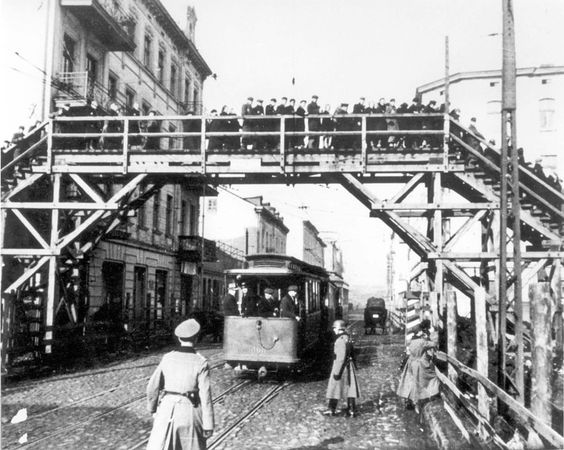 |
| Lodz, Poland, Jews on the bridge above Zgierska St., which connects the two parts of the ghetto. February 1941. |
February 1, 1941: US Military Reorganization
February 2, 1941: Wehrmacht Supermen
February 3, 1941: World Will Hold Its Breath
February 4, 1941: USO Forms
February 5, 1941: Hitler Thanks Irish Woman
February 6, 1941: Operation Sunflower
February 7, 1941: Fox Killed in the Open
February 8, 1941: Lend Lease Passes House
February 9, 1941: Give Us The Tools
February 10, 1941: Operation Colossus
February 11, 1941: Afrika Korps
February 12, 1941: Rommel in Africa
February 13, 1941: Operation Composition
February 14, 1941: Nomura in Washington
February 15, 1941: Churchill's Warning
February 16, 1941: Operation Adolphus
February 17, 1941: Invade Ireland?
February 18, 1941: Panzerwaffe Upgrade
February 19, 1941: Three Nights Blitz
February 20, 1941: Prien's Farewell
February 21, 1941: Swansea Blitz Ends
February 22, 1941: Amsterdam Pogrom
February 23, 1941: OB-288 Convoy Destruction
February 24, 1941: Okuda Spies
February 25, 1941: Mogadishu Taken
February 26, 1941: OB-290 Convoy Destruction
February 27, 1941: Operation Abstention
February 28, 1941: Ariets Warns Stalin
2020
